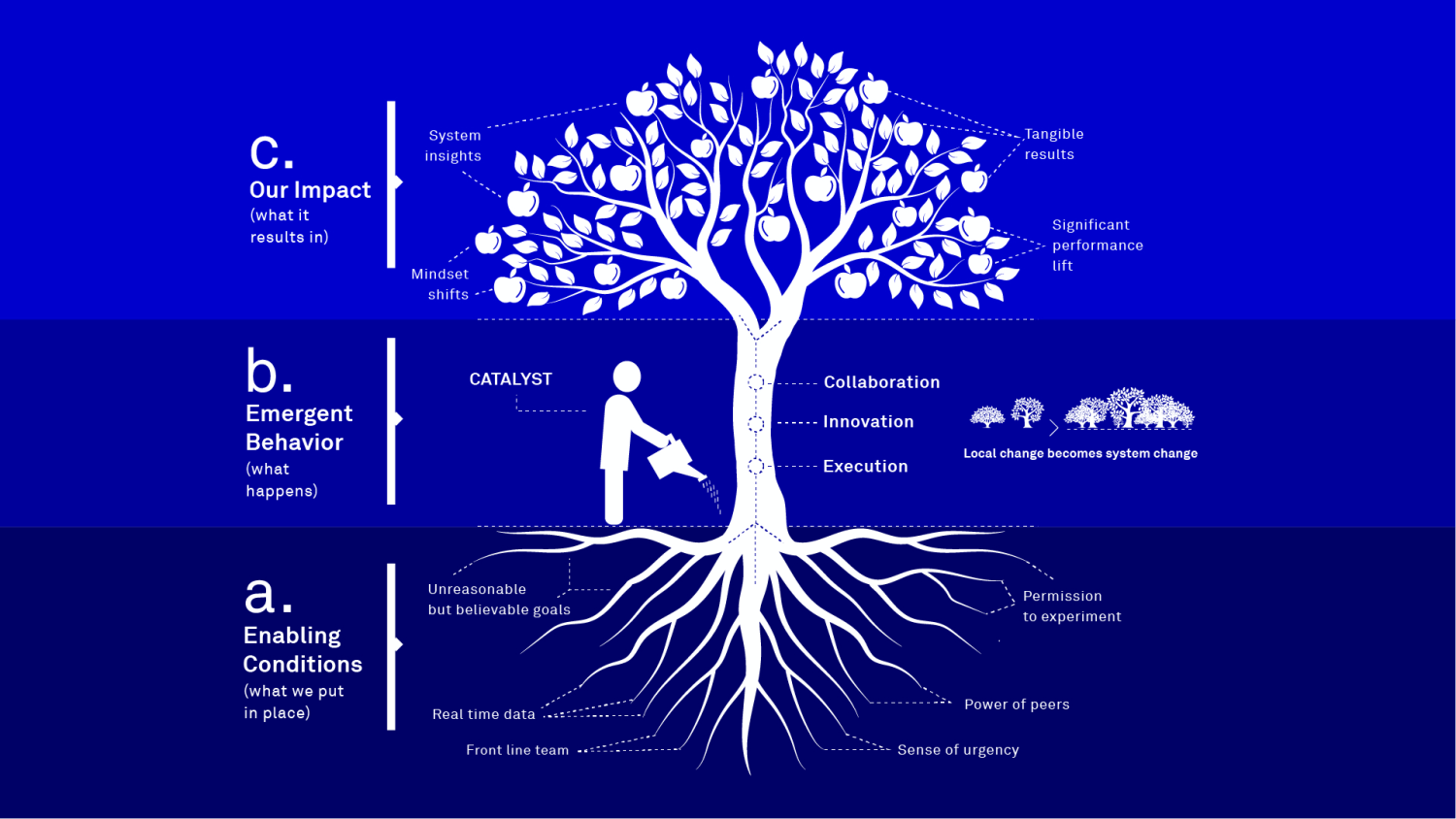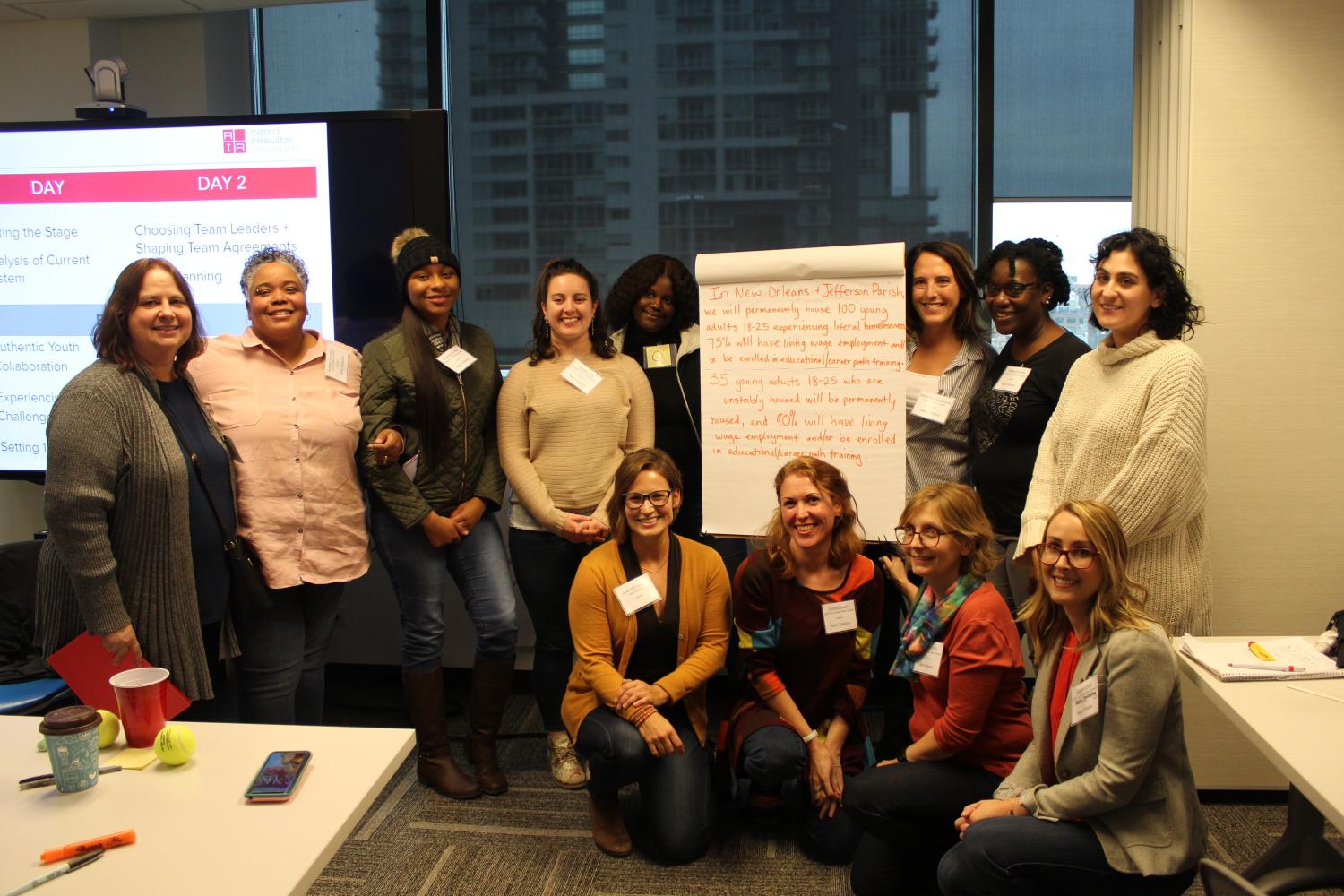
"If you want to change the system, get the system in the room." Let's look at why the 100-Day Challenge works in every country and every sector. Learn more about the enabling conditions that systems change must be rooted in.
Regardless of geography, sector, and challenge, we find that most social systems struggle to collaborate, innovate and execute effectively in order to achieve different, positive, and tangible results.
Whether we are working with the United Kingdom's National Health Service (NHS), a State-level anti-corruption system in Mexico, or a Housing Continuum of Care in a city in the Northern United States, we often encounter the same conditions holding the problem of achieving tangible and positive results, in place:
- Siloed working within and between system institutions
- Leaders who are overwhelmed or disconnected from operational realities
- Mistrust between government and citizens, between service providers and service users
- A lack of shared objectives
- Challenges in what and how to prioritize
- Bureaucratic roadblocks
- A lack of clear communication
- Inertia brought about by analysis paralysis
All these can feel (and often are) overwhelming long-term obstacles in the way of positive, collective system change. RE!NSTITUTE work, and our 100-Day Challenge methodology, work to shift those conditions holding the problem in place by injecting into that system:
- A sense of collective urgency (and responsibility) around the problem
- A need to deliver tangible results
- Freedom to experiment and innovate
After working on four continents in various high, middle, and low-income countries with systems as varied as health, justice, agriculture, and more, we're excited to share what we have learned (and unlearned) about achieving social change impact.
During a crisis, the factors that normally get in the way of swift, effective action fall away. Clashing egos, conflicting agendas, aversion to risk-taking, bureaucracy and red tape, and poor methods of communication, are suddenly easier to make disappear. Previously impossible tasks are accomplished in record time, and group members operate with a higher level of team spirit, energy, and creativity.
The COVID-19 pandemic reminded us that when humans face a crisis that cannot be solved in previously tried-and-tested ways, we can (and must) come together across organizational, systemic, and national boundaries to overcome. But we do not need to wait for unprecedented disasters to create the conditions that can unleash this shared capacity. 100-Day goals can help inject the sense of urgency and high stakes that will drive a group of previously disjointed stakeholders to come together and make progress toward long-term plans and reform efforts. Committing to an unreasonably ambitious short-term effort cuts the time available typically lost in going around in circles, distrusting each other, or shirking responsibilities.

Long-term systems change efforts often share a common point of departure: build (local) capacity and results will follow. We at RE!NSTITUTE have seen time and time again that it is often the other way around; the need to deliver tangible results, combined with that sense of urgency, unleashes capacity that has often lain dormant, siloed, and untapped.
These results are essential to build the confidence and belief that our larger system change ambition is possible amongst the very people we task with making it happen: the frontline.
- How often is change mandated from the top of the hierarchy?
- From the center of government?
Far from the realities of a doctor in an emergency room, a street outreach worker, or a public prosecutor listening to another domestic violence victim. In 100-Day Challenges, the achievement of these tangible results is owned by those closest to the problem, building on their unique and collective expertise whilst feeding leadership with the system insights necessary for them to drive the change at a broader scale. Results are the catalyst that brings about the collaboration, innovation, and execution needed for system change.
Freedom to experiment and innovate
When challenging frontline teams to pursue tangible results, we often use the term ‘unreasonable but believable goals’ - this helps illuminate the third essential condition for impacting systems change. Experimentation. The ambition of 100-Day Challenge goals means that they cannot be achieved through the usual means, they incentivize testing new paths and processes because the old ones won’t work!
Through iteration, teams experiment with emergent practices. 100-Day Challenges provide a safe space in which to ‘fail’ and try again, learning what works and building the collaboration muscles for multi-disciplinary work they will need for the long term. Coupled with a robust monitoring, evaluation, and learning approach that supports frontline teams and leadership to actively learn what works and why and prevents governments from locking on prematurely to a specific path to change. Experimentation combined with learning allows for new solutions to emerge and creativity to be unlocked, all fuelled by results and collaboration.
RE!NSTITUTE’s sustainability studies have shown that collaboration enriched the ideas and experimentation of the teams. Interviewees reported that it was the first time that many of them had the opportunity to work closely with people from other parts of their system. This inevitably leads to innovation and impact that is greater than the sum of its parts.
Although none of these enabling conditions can quite explain the magic that happens when we bring together organizations and institutions - people from across a system and challenge them to own and pursue their challenges!
Note: We are drawing from the Water of Systems Change work by FSG (2018 - Kania, Kremer & Senge), defining the conditions that hold systemic problems in place as Policies, Practice, Resource Flows, Relationships and Connections, Power dynamics, and Mental Models
